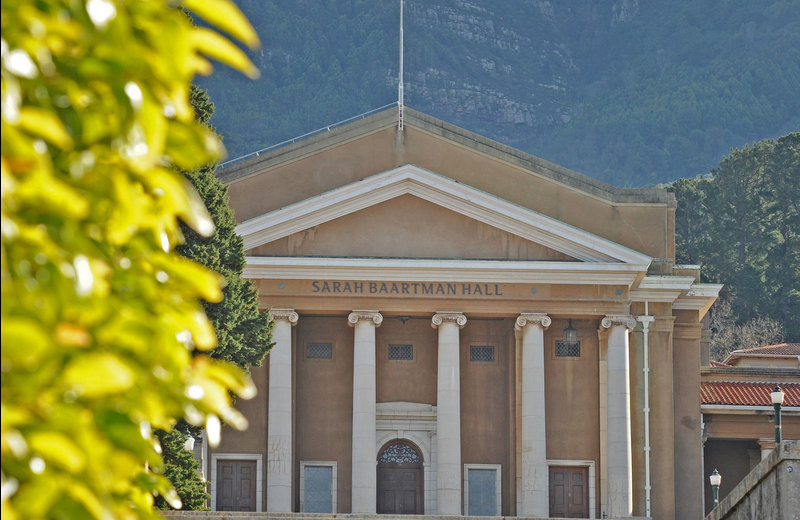UCT graduates take home over R4.5m in Motsepe-backed prize
09 May 2024 | Story Selomina Phekelela. Photo Lerato Maduna. Read time 6 min.
Omnivat, a renewable energy startup founded by five University of Cape Town (UCT) graduates, are the runners-up of a prestigious energy innovation competition backed by billionaire Patrice Motsepe.
With a cash prize of $250 000 (R4.6 million), they set out to explore partnerships with healthcare facilities in the Eastern Cape as pilot sites for their project - essentially a power system consisting of solar panels, batteries, and hydrogen, pre-packaged in a shipping container. The innovative design creates a shaded marketplace that provides reliable power to users, even when the sun isn't shining, News24 previously reported.
The solution targets rural and peri-urban communities.
The Milken-Motsepe Prize in Green Energy, established last year, seeks to give innovators a chance to scale up their solutions for reliable, affordable, and sustainable electricity in Africa. It is a collaboration between the Milken Institute - a nonprofit think tank based in Santa Monica, California, with six other global offices - and the Motsepe Foundation, a South African nonprofit founded by businessman Patrice Motsepe and his wife, Precious Moloi-Motsepe, which is dedicated to tackling poverty, unemployment, and inequality.
Omnivat founder and team leader Randy Kabuya and co-founder and civil engineer Deney van Rooyen were flown to Los Angeles for the awards ceremony and conference this week.
They found themselves in the company of key players in philanthropy, finance, and innovation.
One of Van Rooyen's highlights is having met and spoken to US pastor, author and filmmaker TD Jakes.
"This conference is crazy – it draws some of the biggest names," said Van Rooyen. "We have even bumped into TD Jakes and walked past the likes of Boris Kodjoe, Chris Tucker, and Will.i.am in the hallways!"
Recalling the moments before the winners were announced, Kabuya, a young engineer from the Democratic Republic of Congo, said he was very tense, "knowing that I pulled some of my best friends into this competition with no guarantee of what the outcome would be and whether the past 12 months would lead to an acknowledgement of all our efforts."
Anticipation was at its peak for the Omnivat team.
Finally, the moment arrived.
Aftrak, an initiative based out of the UK and Malawi, were announced the winners of the $1 million (R18 million) grand prize. The solution uses solar microgrids and solar-powered tractors in deep-bed farming, helping to triple agricultural yield and increase farmer incomes while providing electricity to rural communities.
Being named runner-up, however, was still a worthy achievement for Omnivat. "I feel such a great sense of validation and accomplishment, especially for the speed at which we did this, having started from zero just 10 months ago," Kabuya told News24.
Compared to other teams, Kabuya said they did all the work without any company backup or access to resources.
"It was our initiative and idea, accomplished by our efforts," he said.
Omnivat described its solution as an integrated package of solar panels, batteries, and hydrogen technology, all pre-packaged in a shipping container.
The future looks green
With more than R4.5 million in prize money and increased credibility, the team is eager to seek additional funding and partnerships to move their project forward. "We will need additional funding and partnerships to realise this dream – potential funders have already approached us, and we hope that winning more than R4.5 million in the Milken-Motsepe Prize will demonstrate Omnivat's credibility and capability. We are open for business," said Van Rooyen.
The team hopes to innovate community-based revenue models that see communities having a say in their service delivery and infrastructure.
"We will explore partnerships with healthcare facilities in the Eastern Cape as pilot sites for our project," Van Rooyen said.
On a personal level, Van Rooyen said that the recognition of being runner-up had fuelled their motivation and commitment to the project:
"We are now more motivated on two levels – one, we are all that more committed to this vision and confident in our ability to make it happen; two, we recognise how much room we have for growth and innovation in a space where there is so much opportunity and so much innovation taking place."
The team says being part of the competition has been an amazing experience, with so many panel discussions on almost any topic.
"In a competition with over 3 800 applicants, we are humbled and encouraged by the fact our idea has found global recognition and merit, and we just want to push the boundaries further," said Kabuya.
When asked when they plan to return home, Kabuya and Van Rooyen humorously replied: "We're not jumping on a 40-hour journey right away! We'll be exploring LA and making additional connections before returning to South Africa towards the end of May."
The team says all this experience is a testament to what they can achieve and accomplish going forward.
"It takes a village to make an Omnivat," said Kabuya.










